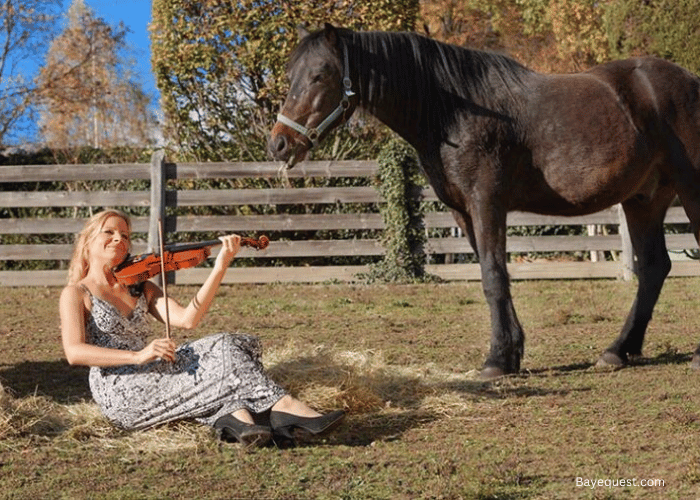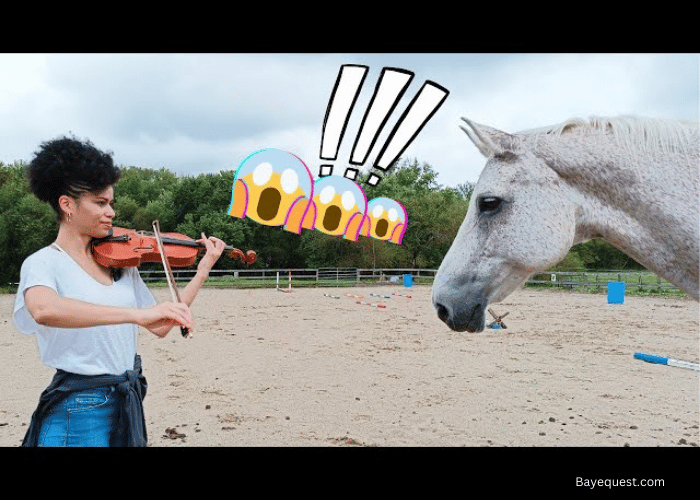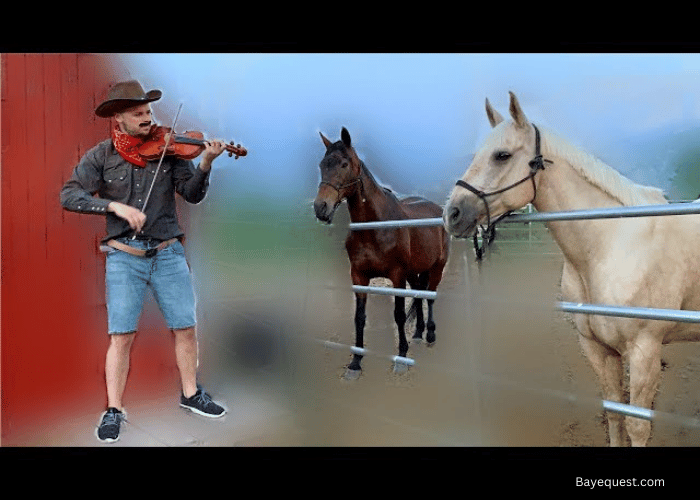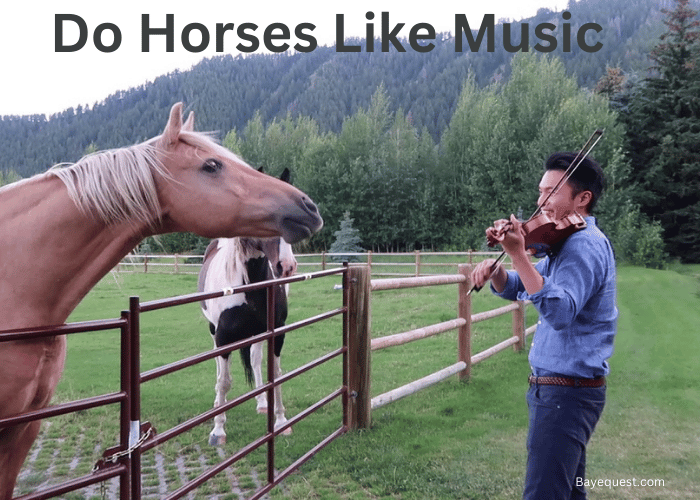Have you ever caught yourself humming a tune while working around horses and wondered if they enjoyed the concert? It’s not just you.
Whether horses appreciate a good beat or melody is more common than you might think. This blog digs into the intriguing world of horses and their relationship with music.
We’ll explore what science says, share heartwarming stories from horse lovers, and find out if horses have a favorite playlist. Join us on this journey to answer the question, “Do horses like music?”
Horses and Music: Key Takeaway
Yes, horses do like music. Classical and country music can positively impact equine behavior by masking external noises and vibrations, promoting relaxation, and balancing their mood. Music helps reduce stress and enhances a horse’s overall well-being, making it a valuable tool for equine care.

Do Horses Like Music or Just Feel Relief?
Do horses love music, or does it just make them feel better? It’s a big question with lots of interesting angles. Let’s break it down into easier bits, looking at what science and horse people say.
The science perspective
There hasn’t been a ton of research, but what’s out there is pretty interesting. Studies look at how horses act and feel when they listen to different kinds of music.
Some findings say classical music can chill horses out, making them less likely to pace or shake and even helping their heart rates go down. But does this mean they’re having fun like we do when we jam out?
Not necessarily. It could just be that they’re feeling less stressed or anxious.
Understanding if horses enjoy music is tricky because they show their feelings differently than we do. Instead of dancing or singing along, a horse might just drop its head, look more relaxed, or not seem as stressed.
These could be their ways of showing they’re into the music, or they might just be feeling more at ease.
The anecdotal angle
People who spend a lot of time with horses say they’ve seen horses that seem to have music they like better or act happier when tunes are playing. There are tales of horses looking super chilled or even moving to the music.
This may make it seem like they’re getting more out of it than just stress relief.
Interpreting the signals
Trying to understand if horses enjoy music or just feel less stressed by it means paying close attention to how they act and what’s going on inside them. When music seems to make them less stressed, that’s a plus.
But deciding if they enjoy the music can be a bit like guessing since we’re trying to put human feelings on them.
At the end of the day, if the music makes a horse happier and more relaxed, that’s what matters to most horse owners.
Interesting read: Horse Sounds in Words.
Music and its Effects on Horses
Music’s impact on horses is like a gentle wave that washes over them. Sometimes calming their nerves and even changing their mood.
If you introduce a soft melody into the scene, the ears of the horses relax, their eyes might close softly, and that edginess may melt away.
Studies and stories from horse owners alike tell us that music can indeed have a profound effect. Classical tunes, with their smooth, flowing melodies, often act as a balm, soothing anxious equines.
It’s not just about the genre, though. The rhythm and volume play their parts too.
A steady, gentle beat at a volume that whispers rather than shouts can be the ticket to a relaxed horse.
But why does music have this effect? It might tie back to how horses communicate and interact with their environment.
In the wild, the absence of abrupt, loud noises usually signals safety, allowing the horse to relax. Music, particularly the types that mimic these safe, natural sounds, can create a similar feeling of security.
Yet, it’s not a one-size-fits-all. Just like people, horses have their personalities and preferences. What soothes one might not affect another in the same way.
Some might even perk up and seem to “dance” or show more lively spirits with certain beats.
For horse caretakers, incorporating music into the barn or stable environment can be a tool for enhancing well-being. It’s about observing and learning what works best for your equine friends. Ensure the soundscape contributes to their mental and emotional health.

What Sounds Do Horses Find Pleasant?
Horses, with their keen ears, tend to enjoy sounds that bring peace rather than startle.
Think about the gentle murmur of a stream, the soft rustling of leaves in a breeze, or the steady, rhythmic sound of a human heartbeat. These kinds of sounds can have a calming effect, making them feel safe and at ease.
Their human friends talking in a soft, reassuring tone can also be music to their ears. Just like us, horses feel comfortable in the familiar and friendly.
So, when you chat with them in a gentle, calm voice, it’s not just words they hear, but a melody of safety and care.
Even certain types of music fit their playlist of pleasant sounds. Soft classical tunes or country melodies played at a low volume can be soothing.
It’s the harsh, loud, and sudden noises that can ruffle their feathers—or, well, ruffle their manes!
In essence, horses lean towards sounds that wrap them in a blanket of tranquility, mirroring the serenity of the natural world they’re connected to.
Interesting read: Do horses like to be ridden?
Classical, Country, or Heavy Metal?
The response can be as varied as the personalities of the horses themselves. However, understanding the general tendencies can help us make an informed decision.
Classical music
This genre is often the frontrunner for creating a calm and serene environment for horses. The smooth, flowing melodies and consistent rhythms found in classical pieces have a soothing effect.
This can reduce stress and promote relaxation. For many horses, classical music can be like an audible massage, calming their nerves and even helping with anxiety.
Country music
With its storytelling nature and often mellow tunes, country music can also be a good choice for horses. The gentle strumming of guitars and soft vocals can provide a comforting background noise.
Country music, particularly the softer, acoustic varieties, can evoke the tranquility of a peaceful day out in the pasture.
Heavy metal
Heavy metal, known for its loud, intense, and fast-paced nature, might not be the ideal choice for most horses. The high decibels and rapid changes in tempo and intensity could lead to stress or anxiety in horses.
Unlike humans, who might find excitement or energy in heavy metal music, horses might interpret the loud and unpredictable sounds as alarming.

Factors Affecting Horses’ Preferences
When it comes to understanding horses’ preferences for music, it’s clear that one size does not fit all. Several factors can influence a horse’s likes and dislikes. These may include:
Breeds
Each horse breed comes with its own set of characteristics, behaviors, and, preferences. For instance, some breeds are calm and steady, which might make them more receptive to softer, soothing music.
Others, known for their high energy and alertness, might respond differently to stimuli, including music. This doesn’t mean all members of a breed will react the same way, but breed characteristics can offer clues about what a horse might prefer.
Conditioning
Conditioning plays a crucial role in shaping a horse’s preferences. This refers to the experiences and training a horse has gone through. If a horse is conditioned positively with certain types of music, it’s likely to develop a preference for them.
For example, if a horse is consistently exposed to classical music during relaxing grooming sessions, it might start associating those sounds with calmness and enjoyment.
Personalities
Just like people, every horse is an individual with its personality. Some may be more curious and adventurous, possibly showing interest in a variety of sounds and experiences.
Others might be more reserved or sensitive, preferring familiar and calming environments. Observing a horse’s personality can give you insights into what kinds of music they might prefer.
Read also: Can a Horse Have Blue Eyes?
FAQs
Can music affect a horse’s mood?
Yes, music can have a significant impact on a horse’s mood. Just like humans, horses can respond to music with changes in their behavior and stress levels. Calming music can help to reduce anxiety and create a more relaxed environment for horses. However, the effect can vary depending on the individual horse.
What kind of music do horses prefer?
While there’s no one-size-fits-all answer, research and anecdotal evidence suggest horses tend to prefer softer, melodious music like classical or gentle country tunes. These genres can help soothe and calm horses, reducing stress and improving their overall well-being. However, each horse is unique, and their preferences can vary.
How can I introduce music to my horse?
Introducing music to your horse is a simple process. Start by playing music at a low volume near your horse’s living area to see how they react. Choose calming genres and observe your horse’s behavior for signs of relaxation or distress. Adjust the volume, music type, and duration based on your horse’s response. Always aim for a positive and calming experience. Remember, the goal is to enhance your horse’s environment and well-being.
Horse and Music: Conclusion
So, do horses jam to tunes just like we do? It seems they might not hit the dance floor, but music strikes a chord with them.
Whether it’s the soothing strains of classical or the homey twang of country, horses have shown us they’re all for a good beat—provided it’s the right kind. Like us, each horse has its playlist preference, shaped by their breed, past experiences, and personality.
Watching a horse lose itself in a moment of musical bliss is a reminder that the love for music transcends species. So next time you play your favorite tune, think about sharing it with your four-legged friend.
Who knows? You might just discover you both groove to the same beat.








